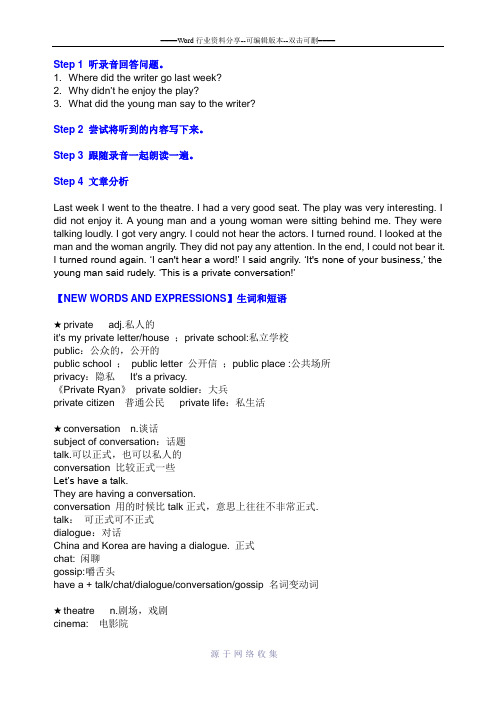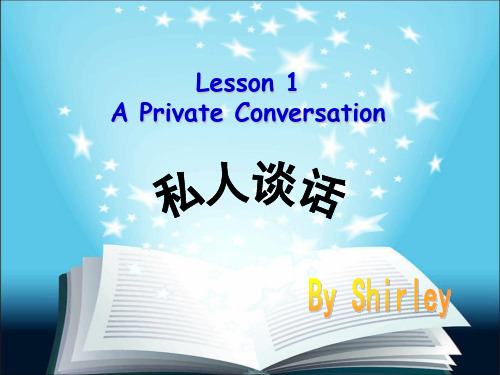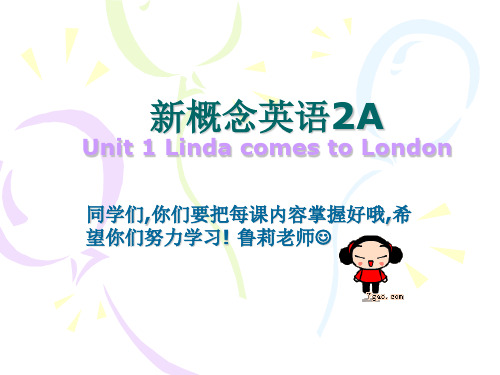新概念第二册第1课课件课件
新概念英语第二册第一课

Attention
n. 注意
Attention, please. pay a little/some/more/no /close/great/enough attention pay attention to sth draw one’s attention That’s all, thank for your attention
6. He had a good seat. He was sitting in a good( ). A. chair b. place c. armchair d. class 7. He was a young man. He wasn’t very ( ) A. old b. big c. tall. d. large 8. The writer looked at the man and the woman angrily. He was very ( ) A. sad b. unhappy c. cross d. pleased 9. The writer could not bear it. He could not ( )it. A. carry b. suffer c. stand d. lift 10. The young man spoke rudely. He wasn’t very A. clever b. rude c. polite d. kind
Where there is a will, there is a way.
言归正传Get down to business
Lesson 1
A
private conversation
新概念英语第二册第一课最全讲义

Step 1 听录音回答问题。
1. Where did the writer go last week?2. Why didn’t he enjoy the play?3. What did the young man say to the writer?Step 2 尝试将听到的内容写下来。
Step 3 跟随录音一起朗读一遍。
Step 4 文章分析Last week I went to the theatre. I had a very good seat. The play was very interesting. I did not enjoy it. A young man and a young woman were sitting behind me. They were talking loudly. I got very angry. I could not hear the actors. I turned round. I looked at the man and the woman angrily. They did not pay any attention. In the end, I could not bear it.I turned round again. ‘I can't hear a word!’ I said angrily. ‘It's none of your business,’ the young man said rudely. ‘This is a private conversation!’【NEW WORDS AND EXPRESSIONS】生词和短语★private adj.私人的it's my private letter/house ;private school:私立学校public:公众的,公开的public school ;public letter 公开信;public place :公共场所privacy:隐私It's a privacy.《Private Ryan》private soldier:大兵private citizen 普通公民private life:私生活★conversation n.谈话subject of conversation:话题talk.可以正式,也可以私人的conversation 比较正式一些Let’s have a talk.They are having a conversation.conversation 用的时候比talk正式,意思上往往不非常正式.talk:可正式可不正式dialogue:对话China and Korea are having a dialogue. 正式chat: 闲聊gossip:嚼舌头have a + talk/chat/dialogue/conversation/gossip 名词变动词★theatre n.剧场,戏剧cinema: 电影院★seat n.座位have a good seat(place)take a seat : 座下来,就座take your seat/take a seatIs the seat taken? 这个座位有人吗?no/yessit Sit down ,pleaseseat Take your seat, please.Be seated, please 更为礼貌seat是及物动词,后面有宾语sit是不及物动词,后面不加宾语seat后面会加人; seat sb; seat him; seat:让某人就座sit he is sitting there.you seat him;〖语法精粹〗When all those present__, he began his lecture.A. sitB. seatC. seatedD. were seatedsit, sit down; seat, be seated; take a seat★play n.戏★loudly adv. 大声的★angry adj. 生气的cross=angry ; I was angry. He was cross.Don't get cross with me, it wasn't my fault.不要对我生气,那不是我的错。
新概念二第一课课件Lesson 1 A private conversation

4. seat n.座位 v.安排坐下,使就坐 have a seat/take a seat 就座 (比sit down更有礼貌) have a good seat 有一个好位置 辨析:seat/sit seat只做及物动词,sit可做及物动词也可做 不及物动词 be seated 坐着,坐下;位于
新概念英语 二
welcome
主讲老师:Arthur
新概念英语二
新概念英语第二册共计96课,分4个单元(每24课一 个单元)前两个单元是对新一语法的操练和重现;第三 个单元较难,是一些复合句,第四个单元为复习单元, 每单元有一个综合考试。 新二是我们学习英语的一个过渡,同时也是一个转变。 从一个会说日常英语的人转变成一个敢动笔进行基本写 作的人。以96篇小故事为素材,培养学生听、说、读、 写的基本能力,其优势在于扩充词汇、统揽语法、集合 实践、听说兼修。在掌握第一册基本语法的基础上,由 浅入深逐步讲解语法要点,使学习者轻松掌握枯燥的语 法;通过对句型结构的分析及对短语用法的讲解,使学 习者在真正的听说读写中运用地道的句型。
问题是你想要做什么
二、主语———动词 在这一句型中,动词为不及 物动词及不及物的动词词组。在有的句子中,不 及物动词可以有状语修饰。 1.The sun is rising. 2.I'll try. 3.Did you sleep well?(well做状语,修饰不及物 动词sleep) 4.The engine broke down. 注意:在此句型中, 有少数不及物动词表达被动含义,表达主语本身 所具有的特性,不用被动语态。 1.The book sells well. 2.The window won't shut. 3.The pen writes smoothly.
新概念第二册第1课

They did not pay any attention.
= They paid no attention.不注意 pay attention注意 Pay attention to sth对...注意 eg.Please pay attention to the notes. Attention,please.请注意。
I turn round.
I turn round = I turned around. 3)翻身 turn over eg. I couldn’t fall asleep; I just turned over and over and over. 4)变得(多指颜色的变 化)系动词=get eg. Leaves turn yellow in the fall. eg. His face turned red with anger.
பைடு நூலகம்
A young man and a young woman were sitting behind me.
Were sitting 过去进行时
现在进行时 强调目前或现阶段正在做某事。
过去进行时 描述的是过去某时正在做某事。 通常用过去进行时描述背景,然后用一般过去式引 出故事的情节。
They were talking loudly. I got very angry.
I turned round again. ‘I can’t hear a word!’ I said angrily.
Word
have a word with sb 跟某人说一句话 have words with sb 跟某人吵架
‘It’s none of your business,’ the young man said rudely. ‘ This is a private conversation.’
新概念二-新概念英语第二册第1课-A private conversation

新概念英语第二册第1课:A private conversation 新概念英语第二册第1课:A private conversationLesson 1 A private conversation私人谈话First listen and then answer the question.听录音,然后回答以下问题。
Why did the writer complain to the people behind him?Last week I went to the theatre. I had a very good seat. The play was very interesting.上星期我去看戏。
我的座位很好,戏很有意思I did not enjoy it. A young man and a young woman were sitting behind me.但我却无法欣赏。
一青年男子与一青年女子坐在我的身后They were talking loudly. I got very angry. I could not hear the actors. I turned round.大声地说着话。
我非常生气,因为我听不见演员在说什么。
我回过头去I looked at the man and the woman angrily. They did not pay any attention.怒视着那一男一女,他们却毫不理会。
In the end, I could not bear it. I turned round again. ‘I can't hear a word!’ I said angrily.最后,我忍不住了,又一次回过头去,生气地说:“我一个字也听不见了!”‘It's none of your business, ’ the young man said rudely. ‘This is a private conversation!’“不关你的事,”那男的毫不客气地说,“这是私人间的谈话!”New words and expressions 生词和短语private(title)adj. 私人的angry新概念英语第二册第1课:A private conversation adj. 生气的conversationn. 谈话angrilyadv. 生气地theatren. 剧场,戏院attentionn. 注意seatn. 座位bear(bore, borne)v. 容忍playn. 戏businessn. 事loudlyadv. 大声地rudelyadv. 无礼地,粗鲁地Notes on the text课文注释1 go to the theatre,去看戏。
新概念英语第二册第1课

1、Last week I went to the theatre.
• 动词go的原义是离开一个地方去另一个地方,与介 词to连用后,常加上主语所要去的目的来代表主语 的动作目的。 • go to the +地点 表示去某地干嘛 • go to the theatre = go to the theatre to see a play去剧 场看戏 • go to the cinema =see a film 去电影院看电影 • go to the dairy 去牛奶店 • go to the + 人 + 's 表示去这个人开的店 • go to the doctor's 去看病;go to the butcher's 买肉
Lesson 1
A Private Conversation
Last week I went to the theatre. I had a very good seat. The play was very interesting. I did not enjoy it. A young man and a young woman were sitting behind me.They were talking loudly. I got very angry. I could not hear the actors. I turned round. I looked at the man and the woman angrily. They did not pay any
★business n. 事, 生意
• • • • • • • • ① n. 生意 business man :生意人 do business: 做生意 go to some place on business:因公出差 I went to Tianjin on business. ② n. 某人自己的私人的事情 It's my business. (指私人的事, 自己处理的事) It's none of your business. 不关你的事。
新概念英语第二册Lesson1课件

I could not hear the actors.
Key structures and usage
过去进行时:过去某个时间正在进行 或发生的动作 A young and a young woman were sitting behind me.
They were talking loudly.
• • • • • • • • • • • • • • •
【Key structures】 简单陈述句的语序 陈述句一定是有主语,有动词,有宾语,有句号 6 1 2 3 4 5 6 when? Who? Action Who? How? Where? When? Which? Which? What? What? 1 ---主语,一般由名词、代词或名词短语构成,通常位于动词之前,动词必 须与主语一致,即主语决定动词的单复数形式 2 ---谓语,由动词充当 3 ---宾语,一般为名词、代词或名词短语 4 ---副词或介词短语,对方式或状态提问,往往做状语 I like her very much 5 ---地点状语,一般在方式副词之后,时间副词之前 6 ---时间状语,可以放在句首或句末 简单陈述句一定不能少的是主语, 谓语. 如果问何时何地,是一个固定搭配 when and where
• • • • • •
★business n. 事, 生意 ① n. 生意 business man :生意人 do business: 做生意 ② n. 某人自己的私人的事情 It's my business. (指私人的事, 自己处理的 事) • It's none of your business. 不关你的事。
Language points
以下短语中名词前不加冠词:
新概念英语第二册第1课

enjoy +doing/sth
句型分析: 4. A young man and a young woman were sitting behind me.They were talking loudly. 析: 过去进行时 结构:was/were+动ing 现在进行时:am/is/are+动ing
8. bear v.(bore /borne)容忍 承受 负担 n.熊 例:我无法容忍他的爆脾气。 I can ’t bear his hot temper. 辨析:bear/stand /put up with bear/stand忍受,遭受,前者语气 较轻,二者常混用 put up with 忍受,容忍(常用于 口语中)
三、主语———动词———宾语 在此句型中,动词 为及物动词,划线部分为宾语。 1.Do you know these people(them)?(名词或代词 做宾语) 2.I can't express myself in English.(反身代词做宾语) 3.He smiled a strange smile.(同源宾语) 4.We can't afford to pay such a price.(不定式做宾语) 5.Would you mind waiting a few minutes?(动名词 做宾语) 6.I hope that I have said nothing to pain you.(从句 做宾语,即:宾语从句) 注意:并不是所有的及物 动词都可以接上述各种情况做宾语,不同的动词 有不同的用法,所以,在学习动词时,一定要掌 握其用法。
5.What do you want me to do?(不定式做宾补) 6.We thought him to be an honest man.(to be 做宾补) 7.He believed them to have discussed the problem.(不定式的完成式做宾补) 8.He believed her to be telling the truth.(不定 式的进行式做宾补) 9.Did you notice him come in?(不带to的不定 式做宾补) 10.I saw her chatting with Nancy.(现在分词做 宾补) 11.He watched the piano carried upstairs.(过
青少版新概念英语2A全单元课件_unit1(共25页).ppt

New Concept English 2A
5. stand站立 Jacky is standing behind me. Lucy is standing in the bus.
phone电话 Please give me a phone call tonight. The phone is ringing.
New Concept English 2A
3. I’m in the Baggage Hall. I’m waiting for my suitcase. 我在行李区。我正在等我的行李。
Baggage Hall 行李领取厅 suitcase手提箱,皮箱
New Concept English 2A
休息休息,明天再见吧P2
New Concept English 2A
3. Where are you, and what are you doing? 你在哪里?你在干什么?
What is he doing? He is cooking lunch. What are they doing? They are sitting in the sofa.
have got 拥有,有 I have got a beautiful skirt. Concept English
2A
2. I’m in the coffee bar next to the Arrivals exit. 我在进港出口旁的咖啡厅.
next to --旁边,紧靠 Arrivals 机场的进港处 exit 出口
New Concept English 2A
1.next to --旁边,紧靠 He is sitting next to me. Who is that boy next to Lucy?
(完整)新概念英语第二册第一课(包含课文、练习及)

go to the cinema =see a film 去电影院看电影
go to the dairy 去牛奶店
go to the + 人 + 's 表示去这个人开的店
Seat n。 座位
这个座位有人么?Is anyone here? /Is this seat taken, please?
vt。 使就坐
结构:seat oneself 常用be seated形式.
We were seated at the table。
All of us were seated around the table and Aunt Pat served spaghetti for supper.
‘It's none of your business,' the young man said rudely. ‘This is a
private conversation!'
New words and expressions 生词和短语
private adj. 私人的
conversation n。 谈话
enjoy +代词,一般为反身代词
enjoy oneself =have a good time 玩的很开心,过的很愉快
e.g。 I enjoyed myself last night。/I had a good time last night。
③ enjoy +动名词
Jane doesn't enjoy swimming。 She enjoys going to the theatre.
新概念英语第二册-lesson1课件

12 There are a lot of people at the bus stop. 13 The little boy ate greedily an apple in the
kitchen this morning. 14 She draws beautifully. 15 I like music very much. 16 They built a new school in our village last year. 17 The match ended at four o'clock. 18 She received a letter from her brother last week.
3. The play was very interesting.
[参考翻译] 那场戏剧演得非常有意 思。
[语言点] very 为副词,interesting为 形容词,副词修饰形容词一般放在 其前面。
比如: very hot非常热, quiet easy 十分简单,但good enough 为例外。
have a conversation about sth. 例:Shall we have a conversation
about your vacation ?
同义词:
conversation 无拘束或非正式的 谈话
talk
谈话内容可正式或非正式
chat
闲谈、聊天
discussion (小型的)讨论、商议
like意义要深得多。 enjoy music享受音乐, enjoy dinner享受宴会, enjoy life享受生活
② enjoy doing enjoy swimming 喜欢游泳, enjoy fishing喜爱钓鱼 ③ 一般不可说enjoy sb This morning I enjoyed my English
新概念第二册课PPT课件

People who go to a formal Western dinner party for the first time may be surprised by table manners in Western culture. Knowing them will help you make a good impression. Having good table manners means knowing, for example, how to use knives and forks, when to drink a toast and to behave at the table. Beside your napkin you will find a small bread roll and three glasses—one for the white wine, one for the red wine, and one for the water. There are two pairs of knives and forks on the table, forks on the left and knives on the right of the plate. When you see two spoons, the big one is for the soup and the small one for the dessert. When you sit down at the table, you can take your napkin, unfold it and put it on lap.
Discuss: Which of the following behaviors are polite or impolite at a Western dinner party. Write “P”(polite) or “I”(impolite) in brackets.
新概念英语第二册课课件 Lesson

•A public house which was recently bought by Mr. Ian Thompson is up for sale.
•a public house 酒吧、酒店,口语缩略为pub •up for sale 有待出售,供出售 •be up for 有待于…,为了某一目的 •This problem is up for discussion. •这个问题有待于讨论。 •on sale 打折卖 for sale 待售;出售
• ★shake(shook,shaken) v. 摇动 • vt.&vi. 摇,摇动,抖动 • Mr. Thompson shook his head. • His hands appear to be shaking. • 他的手看上去在发抖。 • ② vt. 同…握手 • Dan shook hands with him.
A public house which was recently bought by Mr. Ian Thompson is up for sale. Mr.Thompson is going to sell coming from the bar. The next morning, he found that the doors had been blocked by chairs and the furniture had been moved. Though Mr.Thompson had turned the lights off before he went to bed, they were on in the morning.He also said that he had found five empty whisky bottles which the ghost must have drunk the night before. When I suggested that some villagers must have come in for a free drink, Mr.Thompson shook his head. The villagers have told him that they will not accept the pub even if he gives it away.
课件新概念第二册Lesson 1 A private conversation 课件

私下地 in private
.
She studies in a private school Let's discuss this later in private
n. privacy 隐私.
.
a
. private
conversation
It's my privacy. It's none of your business!
go to the theatre = go to the play 去看戏 go to the cinema 去看电影(英式英语) go to the movies 去看电影(美式英语) go to the pictures/films 去看电影
2. The play was very interesting.
moving感动的
moved受感动的
amusing有趣的 amused觉得有趣的
exciting激动人心的 excited令人激动的
boring无聊的
bored 觉得无聊的
3. I did not enjoy it. 主+谓+宾
① enjoy+名词 enjoy your life/the meal/the sunshine 享受生活/一顿饭/阳光
2.以辅音字母加y结尾的变y为i,然后再加-ly,如happy---happily,
easy-easily, busy-busily
3.少数以e结尾的形容词,要去掉e再加-ly。例如:true-truly, terribleterribly,possible-possibly等。 但绝大多数以e结尾的形容词仍然直接加ly。例如:rude-rudely, polite-politely, wide-widely等。
